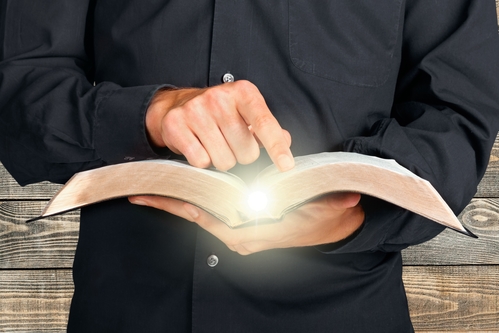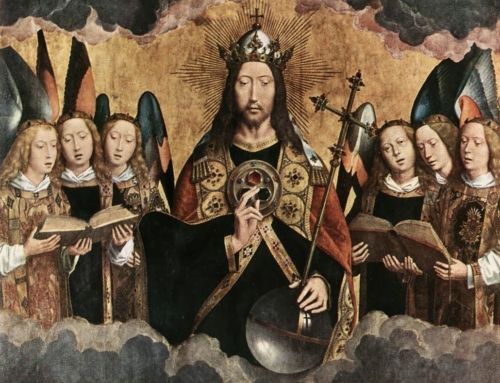I don’t take the bait about “Why Catholics Call Their Priests ‘Father’ ” or “Why Do You Worship Mary?” or “Do Catholics really pray to bells and candles?” or “Why do you kiss the bones of dead people.”
When it comes to Catholic apologetics I always go straight to the bottom line.
I go to the authority question. If that question is not resolved then every other discussion is only matter of swapping opinions or engaging in a Bible verse shoot out.
It is important, therefore to be clear on the basics of the Catholic understanding of authority.
It is rooted in the fact that Jesus Christ was sent by God and had all authority on heaven and earth. (Mt 22:18)
Jesus exercised this authority by 1. Teaching the truth 2. Healing the sick 3. Vanquishing the Devil. 4 forgiving sin. He told his apostles to continue this work. (Mt. 22:19)
He delegated that authority to his apostles because he said, “As the Father has sent me I am sending you.” (Jn 20:21)
The apostles appointed their successors who are the bishops and priests of the Catholic Church. They did this through the ceremony of laying on of hands. (I Timothy 4:14)
This is what the early Christians believed about apostolic succession:
- “The Apostles received the gospel for us from the Lord Jesus Christ and they went out full of confidence in the Holy Spirit and appointed…bishops and deacons…they appointed them so that tested men would succeed their ministry.” Clement of Rome, 95 AD
- “When you obey the bishop you obey Christ…it is essential that you do nothing without the bishop. Submit to the priests as to Christ.” Ignatius of Antioch, 115 AD
- “By knowledge of the truth we mean the teaching of the Apostles… the order of the Church as established from earliest times throughout the world…preserved through the Episcopal succession: for to the bishops, the apostles committed the care of the Church in each place which has come down to our own time…safeguarded by the most complete exposition the reading of the Scriptures without falsification and careful and consistent exposition of them avoiding both rashness and blasphemy.”
- We can enumerate those who were appointed bishops in the churches by the apostles and their successors down to our own day. They were handing over to them their own office of doctrinal authority.” St Irenaeus, 160 AD
That same authority continues in the Catholic Church today.
The Holy Father really is the successor of Peter and the bishops are the apostles alive and active today.
This is why Catholic priests and the Catholic faithful need to be true to the teachings of the Catholic faith. Without it we are simply trading in our own opinions. When we contradict church teachings, dissent from Church teachings we are taking ourselves outside the line of authority and our views–no matter how seemingly reasonable and no matter how passionately we hold them–are dust in the wind.
Protestants will come to the discussion armed with their doctrine of sola Scriptura–the Bible alone. But this is, in itself, a late invented, non-Biblical doctrine, and it only takes a moment’s thought to realize that the Biblical authority depends on multiple variables: which translation you use, which theology you espouse, which interpretation you take–and that means it is one Protestant’s version and opinion versus the next Protestant’s version and opinion.
They have no more authority or weight than anyone else’s opinions. You may argue your point and rage against the authority of the church, or pick and choose your Bible verses, but step outside the church and you are on your own.
The analogy I use is that of the barque of Peter. Launch out on your own and your on the wild and wide open sea in little more than a self inflated life raft.
The barque of Peter may be an old ship. She may be creaky and leaky at times. She may have troubles in the engine room and the cargo in the hold may be rotting, but she’s still more seaworthy than your own little lifeboat, and even though she may be tossed about by the winds and stormy seas she’ll make it to the port at last.
Better to stay on board, batten down the hatches and weather the storm than to set off on your own.







Well put.
There are a few things that seem to irritate my Evangelical “once saved, always saved” friend and those would be some simple questions: where did the Bible come from and who preserved it? Also, I like to point out all the different churches in his neighborhood and ask him what’s the difference and who has the truth? There can only be one truth, not multiple versions of it. He has great difficulty with those questions.